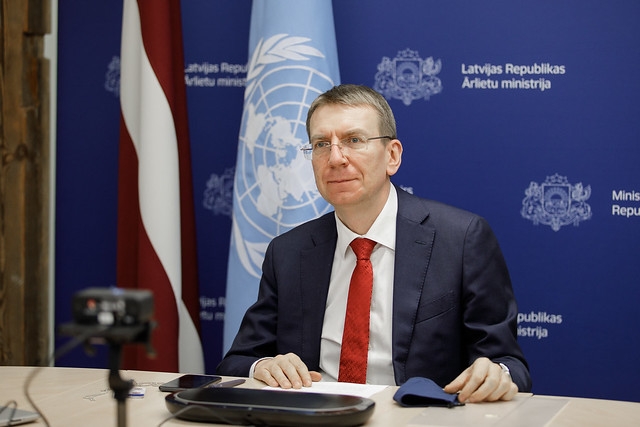On 22 January 2020, the Latvian Minister of Foreign Affairs, Edgars Rinkēvičs, took part in the informal online Arria-formula meeting of the United Nations Security Council concerning media freedom in Belarus.
In his remarks to the participants, Edgars Rinkēvičs voiced serious concerns over the current human rights situation in Belarus. He underlined that since the rigged presidential elections on 9 September 2020, Belarusian authorities have stepped up the comprehensive campaign launched earlier to restrict freedom of speech. Several hundred detentions of journalists have taken place, criminal charges have been brought against them, and internet censorship is ongoing. Cases of violence and inhumane and degrading treatment have been confirmed, the Minister noted.
Edgars Rinkēvičs called on the international community to respond swiftly and decisively to developments in Belarus. We rely on an active involvement by the United Nations High Commissioner for Human Rights, he said. The UN Human Rights Council should, as soon as possible, establish an independent international body for an in-depth investigation into the violations of human rights in Belarus, the Latvian Foreign Minister emphasised.
The Foreign Minister confirmed that the Latvian government will continue providing support for Belarusian civil society. A number of programmes are being implemented, including rehabilitation of, and psychological support for Belarusian journalists who have become victims of the violence and repression.
The participants of the meeting included Irene Khan, the United Nations Special Rapporteur for freedom of expression and opinion; Sviatlana Tsikhanouskaya, the presidential candidate for the Belarusian opposition; and Pavel Latushko, Member of the Presidium at the Coordination Council established by the Belarusian opposition. The meeting was chaired by the Estonian Foreign Minister, Urmas Reinsalu.
Background information
The Arria-formula meetings of the United Nations Security Council are of an informal nature and can be convened by any UNSC member. The 22 January meeting took place at the initiative of Estonia.
The UNSC is composed of 15 members: five permanent members with veto rights –China, France, Russian Federation, the United Kingdom, and the United States – and ten non-permanent members elected for two-year terms according to a regional representation principle.
Estonia has been elected as non-permanent member of the UNSC for the term of 2020–2021.





